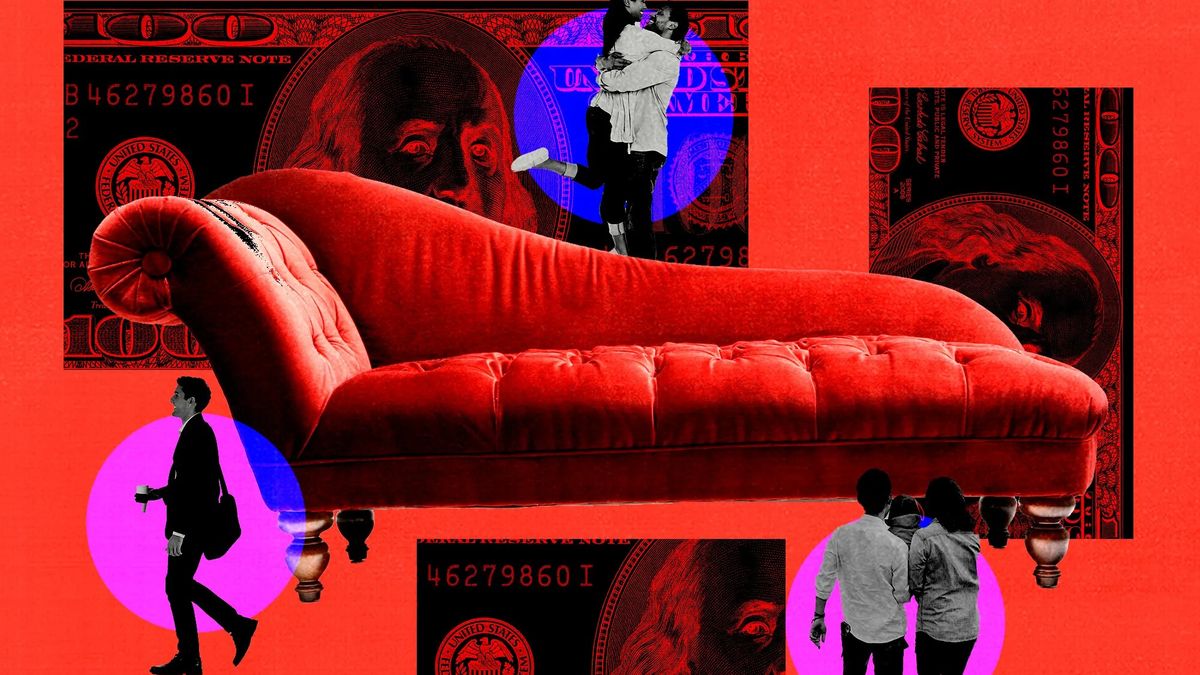




It’s easy to think that getting that big promotion goes with a bulging salary increase would solve all problemsbut would it?
As you have found out Business Insider —interviewing therapists with clients across the socioeconomic spectrum from so-called ALICEs to HENRYs and above —although it’s easy to understand why having a low income can cause stress, especially with growing wealth inequality, the rich have their own worries.
What do people with different incomes talk to their therapists?
People with low income
Anna Nathanson, a clinical social worker and therapist in New York, runs a website called Low-Cost Therapy NYC. ensures that “Financial instability really eats away at people’s souls”.
It not only affects people’s physical well-being, but also their interpersonal relationships and self-esteem, which for many is linked to money.
According to Intrum’s European Consumer Payments Report, in Spain, three out of 10 respondents acknowledge that their mental health has been affected by financial worries. Economic difficulties also impact social life: 1 in 3 Spaniards recognize that their concern about money makes their closest relationships difficult.
In therapy, clients talk about arguments about money with their partner, the job searchhaving to rely on friends for childcare, or how their income affects their self-esteem, Nathanson reveals.
It has also helped patients overcome chronic trauma, such as depression or nightmares, that they have developed from repeatedly not having their basic needs met.

Dr. Ashley Castro, a New York clinical psychologist and founder of Healwise, a nonprofit that offers affordable therapies, clarifies: “Poverty comes with many different types of stress.”
He adds: “There are many things that are out of your control and that can be difficult emotionally. It is a reality that life can be hard if you don’t have much money“.
ALICEs
People known as ALICE (asset limited, income limited, and employed) are those who earn enough to be above the poverty line, but have difficulties in meeting the cost of living.

Dr. Tracy Williams, a psychologist and financial therapist, says that people with little money can end up spending more than necessary and going into debt because they might be “trying to live a life that they want for themselves and that still can’t afford“.
On the other hand, people who have become ALICE—for example, those who have lost wealth or grew up in financially stable homes but They don’t earn as much as their parents— can develop scarcity mentalities, Williams said.
Thus, while some ALICEs will talk in therapy about their need to save money, others will talk about their desire to “live large” and spend recklessly when they can, says the specialist.
HIFIs
HIFIs (High Income, Financially Insecure) earn a high salary, but spend so much that they end up living day to day.

“That’s not because they don’t have enough, but it’s often because they don’t have enough.”and they spend more than necessary or they are not financially aware,” warns Williams.
This may be due to the rising cost of living, which has contributed to financial insecurity for many people, he adds.
Many of Williams’ clients say they also feel pressure to spend beyond their means to keep up with the lifestyles of their peers that they see on social networks.
HENRYs
Some HENRsY (High Income But Not Rich Yet) may appear wealthy in the eyes of others, but they still worry about having enough moneyWilliams summarizes, because “everything is relative.”
He gave the example of higher-income clients who invest in stocks and worry that the markets could crash at any moment, even though that is unlikely.

Kids who didn’t grow up with a lot of money can tell Nathanson that they feel guilty for being rich. They may also say that they feel uncomfortable receiving gifts because they don’t deserve them.
Or they may feel the opposite and have an unnecessary scarcity mentality. These people often talk to Nathanson in therapy about feeling “very nervous about spending on anything and feeling like they can’t afford anything.”
As a couple, you might want to discuss tensions in your relationship if they have different ways of thinking about shared wealth.
Very high assets
“The stereotype is that Rich people’s problems are not real problems.who are only in therapy talking about really inconsequential trivial things,” Castro points out. “But my patients have real problems and they really make an effort.”
Dr. Paul L. Hokemeyer, marriage and family therapist and clinical consultant to high net worth individuals, agrees.
“Deep down, wealthy people suffer from the same mental health and relational problems as the rest of humanity,” he says.

For example, Hokemeyer helps people who feel “objectified” and “vilified” for their wealth; that they feel pressured to use it productively; and who face the “highly stressful and chaotic” process of creating a company.
Wealthy children and adolescents, for their part, often face the expectation of entering elite educational institutions with an intense workload, Castro says. The pressure to achieves can cause perfectionism problems and anxiety disorders, as well as depression due to lack of free time and fun.
Williams says he sees a lot guilt and hopelessness on their wealthiest clients, because they realize they can’t make as big a difference in the world as they would like. And, as people live longer, some worry about not having enough money to maintain your lifestyle as you age.
Wealth can also cause problems within families, he clarifies, with disagreements over wills, inheritances and vacation expenses.
According to Hokemeyer, “wealth can be both a blessing and a curse,” but at the end of the day, “emotions are emotions, pain is pain.”
Get to know how we work in BusinessInsider.
Tags: Psychology
Dictionary: Money
